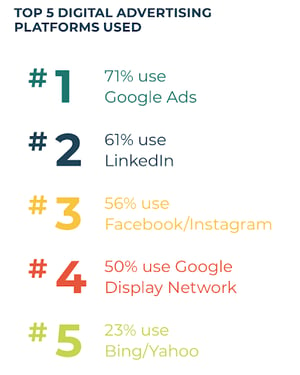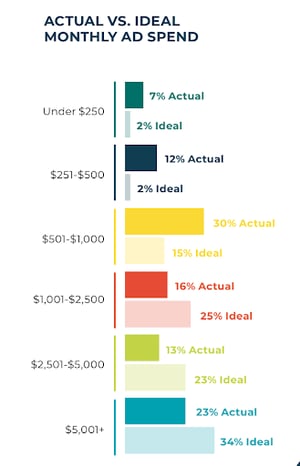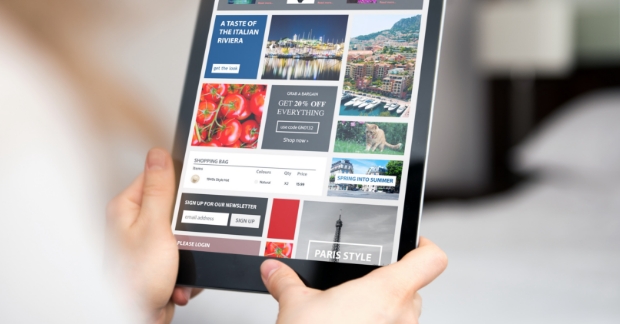B2B tech companies have a new enthusiasm for pay-per-click (PPC) advertising on Google's Search and Display Networks. However, tech industry is not a magic lead gen tool. The campaigns require both creativity and strategic alignment between other active marketing strategies. Tech companies are at the forefront of new products, services, and ideas, many of which businesses and consumers are not aware of which makes search terms and search density a great puzzle for marketers to solve. If the public doesn’t know a new technology exists, how are they going to search for it online after-all?
A Caffeinated Example
Let's start with an example. Tech marketers love coffee (I wake my family up each morning with the sound of my coffee bean grinder), so imagine you are a marketer for a coffee company. We’ll allow you a minute to fantasize about all the espresso and french roast you could ever want, supplied during R&D.
Okay, back to business! As a marketer, you want to advertise on Google's Search Network to make all of us "coffeeholics" aware of your new roast.

Since coffee is both a universally-known term and industry, there is immense search volume for "coffee" and its related terms. The same would occur if you targeted users on the Display Network who have an interest in coffee. You’re able to leverage PPC at the decision stage of the buyer’s journey in this example--right when they’re ready to convert and buy your product. Voila—you have lead conversion and a typical B2C consumer pattern for digital advertising.
Why B2B tech companies don’t fit the typical PPC mold
Now let's turn back to B2B tech companies. At Kiwi, we just strategized and launched a Search Network campaign for a SaaS company specializing in a very specific type of software that has a specialized set of users.. Making it even more interesting, this company refers to its software with a set of terms that have limited search volume—the keywords and phrases are only used within one specific profession and are not in general use. Some of the company’s prospects may be familiar with the industry jargon, but new users will not be. What’s a tech marketer to do?
Paid digital advertising for B2B tech companies often centers around building product awareness, towards the top of the buyer's journey/funnel (depending upon what paradigm you use). This is counterintuitive to many marketers as PPC can be perceived as being a tool used to focus on conversions, towards the bottom of the buyer's journey.
Remember our coffee example? Customers already know that coffee exists, they love it, they search for it, they want to buy it. When marketers use PPC advertising for their wonderfully caffeinated product they expect to see conversions to sales from their digital efforts. This model doesn’t work for many B2B tech companies.
Tech PPC advertising can shine in the early stages of the buyer’s journey as well as the all important decision stage
For tech companies working in lesser-known niches, work needs to be done to build search awareness & industry interest for unique products and services before concentrating on conversions. Prospects need to know the software or service exists before they can form the desire to buy it!
With this in mind, paid advertising can be very beneficial for tech firms. With ads on Google's Search and Display Networks, firms can tackle two goals with one strategy: build industry interest for all marketing arms and grow the number of buyers entering the sales funnel. This two-pronged approach forms the foundation for most of our paid advertising strategies. We build strategies for both of Google's networks for each stage of the buyer's journey:
- Awareness
- Consideration
- Decision
Following this approach for paid advertising as B2B tech companies gives the highest potential for ROI and increased success in marketing campaigns down the road.
Industry norms
Kiwi’s recent State of the Industry report asked hundreds of tech marketers about their experiences with, and strategies for, digital marketing.
 Fifty percent of the respondents indicated that their tech company uses digital advertising with seventy five percent of those using paid search tactics. The platforms and strategies varied: 71% of those with a digital advertising campaign used Google Ads, while 50% also used Google Display Network and 5% dabbled in Bing and Yahoo. These marketers also advertised on LinkedIn (61%) and the Facebook/Instagram power duo (56%) and 61% of them used retargeting tactics within their digital campaigns. The bottom line: tech marketers are leveraging multiple digital advertising platforms to engage B2B audiences in the first three phases of the buyer’s journey. Brand awareness campaigns are micro targeted to these audiences.
Fifty percent of the respondents indicated that their tech company uses digital advertising with seventy five percent of those using paid search tactics. The platforms and strategies varied: 71% of those with a digital advertising campaign used Google Ads, while 50% also used Google Display Network and 5% dabbled in Bing and Yahoo. These marketers also advertised on LinkedIn (61%) and the Facebook/Instagram power duo (56%) and 61% of them used retargeting tactics within their digital campaigns. The bottom line: tech marketers are leveraging multiple digital advertising platforms to engage B2B audiences in the first three phases of the buyer’s journey. Brand awareness campaigns are micro targeted to these audiences.
PPC advertising is a specialized skill set within marketing departments and 50% of those who engage in any type of digital advertising employ an agency for strategy and implementation.
 As far as monthly spends on digital advertising the survey’s top answer was $501-$1000 while the second most popular came in at the opposite end of the budgetary spectrum: $5,000 + monthly . There was a correlation between monthly spend and the overall size of the tech company as well as its stage of product rollout. Larger companies spent more while startups or companies with new product launches found the budget to increase their digital advertising budgets for bursts in 2020. Most respondents who used digital advertising in 2020 believed that their ideal spend was above their current budget.
As far as monthly spends on digital advertising the survey’s top answer was $501-$1000 while the second most popular came in at the opposite end of the budgetary spectrum: $5,000 + monthly . There was a correlation between monthly spend and the overall size of the tech company as well as its stage of product rollout. Larger companies spent more while startups or companies with new product launches found the budget to increase their digital advertising budgets for bursts in 2020. Most respondents who used digital advertising in 2020 believed that their ideal spend was above their current budget.
The Takeaway
PPC advertising, like most other marketing efforts, requires nuanced strategy for B2B tech companies to see results. The recent State of the Industry survey and report shows that tech marketers are using digital advertising to increase their brand awareness within B2B tech audiences.






